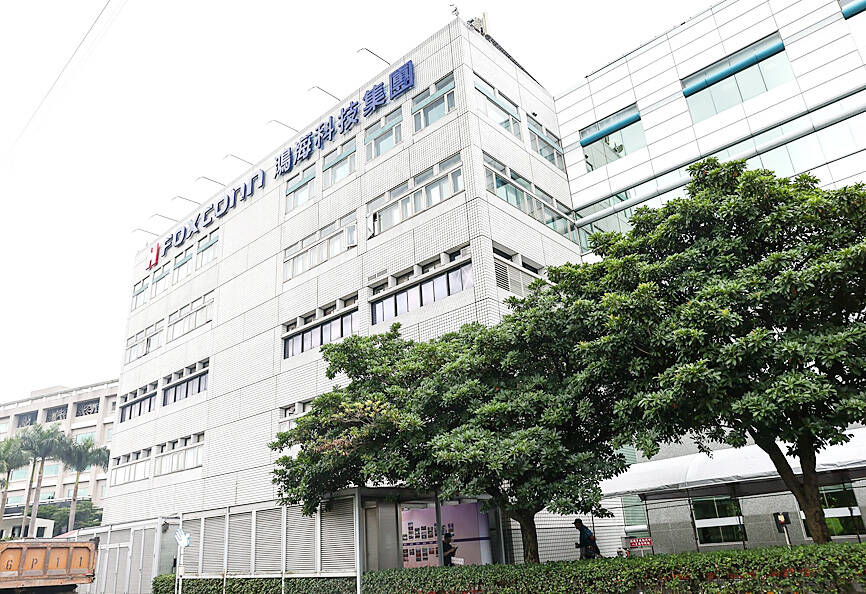Apple Inc’s major manufacturing partner Hon Hai Precision Industry Co (鴻海精密) reported its slowest monthly sales growth since February, stoking concerns about demand momentum for artificial intelligence (AI) infrastructure and iPhones.
Hon Hai, also a key server assembly partner to Nvidia Corp, yesterday reported sales of NT$804.85 billion (US$25.18 billion) for last month, up 8.59 percent year-on-year and marking the highest October level in the company’s history.
Analysts expect the company to grow its sales by 15 percent to NT$2.13 trillion this quarter.

Photo: Cheng I-hwa, Bloomberg
Hon Hai’s revenue in the first 10 months of this year was NT$5.53 trillion, up 9.57 percent year-on-year and the highest for the period on record, company data showed.
The iPhone assembler’s tepid sales growth appeared to reinforce Apple’s weak forecast for the holiday quarter.
“Looking ahead to the fourth quarter, operations are anticipated to show both quarterly and yearly growth,” Hon Hai said in a statement, without giving details.
Hon Hai and other hardware suppliers are riding a wave of spending on servers and data centers from big tech firms including Meta Platforms Inc and Alphabet Inc’s Google.
However, questions are bubbling up about how long the spending will last without a killer AI application to justify the large infrastructure investments.
Still, the capital expenditures of the four largest Internet and software companies — Alphabet, Amazon.com Inc, Meta and Microsoft Corp — are set to climb to well over US$200 billion this year, a record sum for the group.
Executives from each company told investors recently that they would continue to spend large sums next year.
Separately, Hon Hai subsidiary ShunSin Technology Holdings Ltd (訊芯科技) is seeking a permit to invest US$80 million in northern Vietnam to produce integrated circuits, Reuters reported on Monday, citing a document from the Vietnamese Ministry of Natural Resources and Environment.
The proposed plant in Bac Giang Province would focus on producing and processing electronic components, specifically IC boards, the document said.
ShunSin plans to begin operations at full-scale in December 2026, with annual capacity of 4.5 million units, it said.
All products from the Vietnam ShunSin plant would be for export to the US, the EU and Japan, the document added.
Hon Hai already has major operations in Vietnam and has invested more than US$3.2 billion there since fist entering the Southeast Asian country in the 2000s. Most of its manufacturing plants are in the northern provinces of Bac Ninh and Bac Giang.
Additional reporting by Reuters

Sweeping policy changes under US Secretary of Health and Human Services Robert F. Kennedy Jr are having a chilling effect on vaccine makers as anti-vaccine rhetoric has turned into concrete changes in inoculation schedules and recommendations, investors and executives said. The administration of US President Donald Trump has in the past year upended vaccine recommendations, with the country last month ending its longstanding guidance that all children receive inoculations against flu, hepatitis A and other diseases. The unprecedented changes have led to diminished vaccine usage, hurt the investment case for some biotechs, and created a drag that would likely dent revenues and

Macronix International Co (旺宏), the world’s biggest NOR flash memory supplier, yesterday said it would spend NT$22 billion (US$699.1 million) on capacity expansion this year to increase its production of mid-to-low-density memory chips as the world’s major memorychip suppliers are phasing out the market. The company said its planned capital expenditures are about 11 times higher than the NT$1.8 billion it spent on new facilities and equipment last year. A majority of this year’s outlay would be allocated to step up capacity of multi-level cell (MLC) NAND flash memory chips, which are used in embedded multimedia cards (eMMC), a managed

CULPRITS: Factors that affected the slip included falling global crude oil prices, wait-and-see consumer attitudes due to US tariffs and a different Lunar New Year holiday schedule Taiwan’s retail sales ended a nine-year growth streak last year, slipping 0.2 percent from a year earlier as uncertainty over US tariff policies affected demand for durable goods, data released on Friday by the Ministry of Economic Affairs showed. Last year’s retail sales totaled NT$4.84 trillion (US$153.27 billion), down about NT$9.5 billion, or 0.2 percent, from 2024. Despite the decline, the figure was still the second-highest annual sales total on record. Ministry statistics department deputy head Chen Yu-fang (陳玉芳) said sales of cars, motorcycles and related products, which accounted for 17.4 percent of total retail rales last year, fell NT$68.1 billion, or

In the wake of strong global demand for AI applications, Taiwan’s export-oriented economy accelerated with the composite index of economic indicators flashing the first “red” light in December for one year, indicating the economy is in booming mode, the National Development Council (NDC) said yesterday. Moreover, the index of leading indicators, which gauges the potential state of the economy over the next six months, also moved higher in December amid growing optimism over the outlook, the NDC said. In December, the index of economic indicators rose one point from a month earlier to 38, at the lower end of the “red” light.